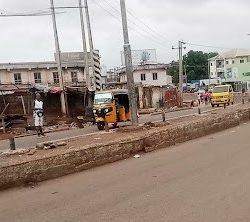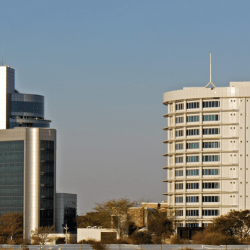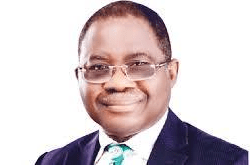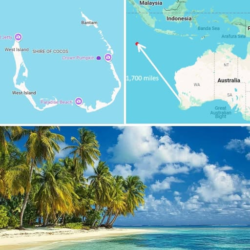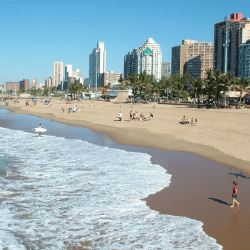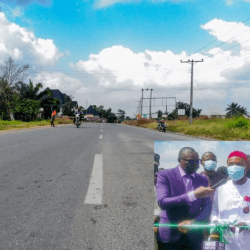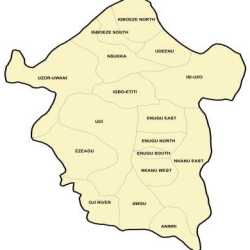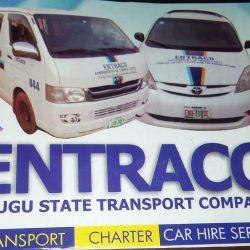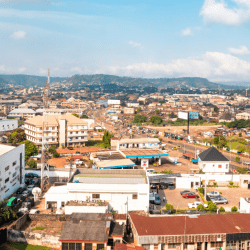The Place
Geography
Enugu State is one of the States in the South Eastern part of Nigeria.

The state shares borders with Abia State to the South, Ebonyi State to the East, Benue State to the Northeast, Kogi State to the northwest and Anambra State to the West.
Though land-locked, Enugu is approximately 2-1/2 driving hours away from Port Harcourt, Calabar and Warri, all coastal cities with major shipping ports. Enugu is also located within an hour’s drive from Onitsha and 2 hours’ drive from Aba, both of which are trading centres in Nigeria. The city is also located within 5 driving hours from Abuja and 7 driving hours from Lagos, the administrative and commercial headquarters of Nigeria respectively.
Lying partly within the semi-tropical rain forest belt of the south, the State spreads towards the north through a land area of approximately 8727.1 km2 (squared). Its physical features change gradually from tropical rain forest to open wood-land and then to Savannah. Apart from a chain of low hills, running through Abakaliki, Ebonyi State in the east to Nsukka in the north-west, and southwards through Enugu and Agwu, the rest of the state is made up of low land separated by numerous streams and rivulets, the major ones of which are the Adada River and the Oji River.
Enugu has good soil and climate, sitting at about 223 meters above sea level, and the soil is well drained. The mean temperature in Enugu State in the hottest month of February is about 36.20C (97.16F), while the lowest temperatures occur in the month of November, reaching 20.30C (68.54F). The lowest rainfall of about 0.16cm3 is normal in February, while the highest is about 35.7cm3 in July.
Historical Prospective
The name of State derives from its capital city, Enugu. The word “Enugu” means “the top of the hill”.
The first European settlers arrived in the area in 1909, led by a British mining engineer, Mr. Kikson. In his quest for silver, he discovered coal in the Udi Ridge.
The Colonial Governor, Lord Lugard, took keen interest in the discovery, and by 1914 the first shipment of coal was made to Britain. As mining activities increased in the area, a permanent cosmopolitan settlement emerged, supported by a railway system. Enugu acquired township status in 1917, and became strategic to British interests.
Foreign businesses began to move into Enugu, the most notable of which were (are) John Holt, Kingsway Stores, British Bank of West Africa and United Africa Company.
From Enugu, the British Administration was able to spread their influence over the Southern Province of Nigeria. The Colonial past of Enugu is today evidenced by the Georgian building types and delightful meandering narrow roads within the residential area originally reserved for the whites, an area which is today called the Government Reserved Area (GRA).
From being the capital of the Southern Provinces, Enugu became the capital of the Eastern Region (now divided into nine States), then the capital of East Central State, Anambra State, (old) Enugu State, and now the capital of the present Enugu State through a process of state creation and diffusion of administrative authority.
Infrastructure
i. Transport
Enugu has a good network of roads, which is currently being expanded and/or rehabilitated by the new civilian Government. The road network comprises Federal roads which connect Enugu to other States of the country, and State roads which connect the various Local Government Headquarters in the State.
Apart from a good network of roads, Enugu is also host to one of the oldest airports and railway stations in Nigeria.
ii. Postal Services and Telecommunications
There is an efficient network of mail delivery service, dominated by such global players as UPS and DHL, in addition to the Government-owned Nigerian Postal Services (NIPOST) and other private local mail delivery companies.
Telephone services are provided by the Nigerian Telecommunications PLC (NITEL), and with the deregulation of the telecommunications sector, new telecommunications providers now have facilities and operations in Enugu State. Internet services and access are also available.
iii. Energy
Electricity supply is relatively stable in Enugu. The Oji River Power Station (which used to supply electricity to all of Eastern Nigeria) is located in Enugu State. With the deregulation of electricity generation in Nigeria, and the proposed privatisation of the National Electric Power Authority (NEPA), the State Government would assist private investors to negotiate the take over and reactivation of the Oji Power Station. This is more so with the proximity of the Enugu coal mines to the power station, a driving distance of about 20 minutes.
iv. Banks and Other Financial Institutions
There is a regional office of the Central Bank of Nigeria in Enugu. The big four banks in Nigeria, First Bank PLC, Union Bank PLC, United Bank of Africa PLC and International Bank of West Africa PLC, all have regional offices in Enugu. There are also regional and branch offices of new generation banks in the State. There is also a good representation of insurance companies and other financial institutions in Enugu.
v. Educational Facilities
Every community in Enugu State has at least one primary school and one secondary school, funded and run by Government. There are also large number of private nursery, primary and secondary schools in Enugu State.
Nigeria’s first indigenous university, University of Nigeria Nsukka (UNN) is located in Enugu State. The State also hosts the Enugu State University of Science and Technology (ESUT), Institute of Management and Technology (IMT), Our Saviour’s Institute of Science and Technology and the Eha-Amufu College of Education. There are also a host of private computer schools and training centres concentrated in Enugu and Nsukka.
The result of this massive investment in education is a well-educated and affordable labour force. The new government in Enugu State is also planning to consciously encourage vocational and technical education at the intermediate level between secondary and tertiary levels of education. There is also deliberated policy for the promotion of computer education at the early stages of formal education.
vi. Medical Facilities
The University of Nigeria Teaching Hospital (UNTH), one of the foremost teaching hospitals in Nigeria, is located in Enugu. In addition to numerous private hospitals and clinics in the State, there is at least one health center or general hospital in every one of the seventeen (17) Local Government Areas in the State.
vii. Radio and Television
Radio and television (TV) services are deregulated in Nigeria. Thus, in addition to local stations, broadcast from interaction satellite and cable TV/radio stations are received in Enugu, and indeed all over Nigeria.
The People
With a population of about 2.5 million people, Enugu State has a population density two and half times the national average. Enugu, the capital city, is home to the Igbo speaking people of South Eastern Nigeria, widely known for their hospitality, industry, enterpreneurship and resourcefulness.
Economically, the State is predominantly rural and agrarian, with a substantial proportion of its working population engaged in farming, although trading (18.8%) and services (12.9%) are also important. In the urban areas trading is the dominant occupation, followed by services, mostly public services though the private sector is presently receiving tremendous impetus. A small proportion of the population is also engaged in manufacturing activities, with the most pronounced among them located in Enugu, Oji, Ohebedim and Nsukka.
The Political System
Government in Enugu State occurs at two levels: the State Government and the Local Governments. Overall authority is exercised by the Executive Governor, elected by popular mandate. Political authority is exercised under a presidential system of Government. There is also a popularly elected legislature, the State House of Assembly.
Political affairs in Enugu State are conducted in an atmosphere of political freedom and respect for human rights. A nation-wide multi-party system with State Chapters governs party politics in the State, as well as in the other 35 States of the Federal Republic of Nigeria.
The Government of Enugu State aims to:
Rebuild the social and physical infrastructure of the State with a view to providing an enabling environment for wealth creation concentrate on its core duties, i.e. giving general policy direction and the provision of basic amenities stimulate economic activities in the rural areas through conscious promotion of agriculture and provision of good, roads, electricity and potable water supply in the rural areas Government’s cardinal programmes are summarised below:
Poverty Alleviation and Rural Development
Government focus is on the following areas:
Agriculture
Government will embark upon capacity building (training of extension officers and farmers) as well as establishing a micro-credit fund for small holder farmers of not less than US10million in annual disbursement. Our target of US$10million is based on our understanding that micro-credit systems in Nigeria have not been able to make the desired impact as a result of insufficient funding. We envisage a system where the minimum unit of credit is N100,00 for new ventures. Only persons who have passed through our training programme would qualify for “new ventures credit”.
Rural Infrastructure
Government will embark upon electrification and sustainable water and sanitation schemes in the rural areas. The vast majority of our rural population lives without electricity and potable water supply. We also propose to construct durable and sustainable roads to provide access to our rural communities and the farms. This programme would cost approximately US$60million in the first 3 years.
Government believes that the success of our policy on agriculture depends on the availability of these infrastructural facilities in the rural areas where agricultural production takes place. The success of our agricultural policy will in turn lead to poverty alleviation. We also believe that the provision of these infrastructural facilities will stimulate economic activities in the rural areas and help stem the tide of urban migration, thereby checking the incidence of urban poverty and squalor.
Institutional Reforms
Government plans to re-structure the public service. The exercise would involve:
a reduction in the size of the work force
re-orientation and re-training of the new work force
payment of terminal benefits to the retrenched staff for alternative employment
Government is already seeking technical and financial assistance to facilitate the funding of training and retraining programmes, as well as payment of terminal benefits to disengaged staff. We are developing a programme that would enable us to provide alternatives, such as self-employment, for disengaged staff.
We also propose to reform the judiciary to strengthen the administration of the justice system. This is key in our effort to pursue a free market system and the rule of law, as well as enthrone accountability in the public service.
Health
The provision of medical facilities in Enugu State ranks second to education in order of priority and takes a large chunk of the annual budget. The State Government is making serious effort to ensure that hospitals and centers, as well as maternity homes, are provided in all the Local Government Areas of the State. Already most of the Local Government Areas have more than one Government hospital in addition to private hospitals maintained by private medical practitioners.
An Orthopaedic Hospital, taken over by the Federal Government, has been established in Enugu. A State Psychiatric Hospital exists on a temporary site. The Mobile Doctor Service, a most singular addition to existing medical facilities, delivers modern medical attention to various grassroot communities. This service is the first of its kind in the Federation.
The most outstanding hospital in Enugu is the University of Nigeria Teaching Hospital (UNTH). The teaching hospital is supplemented by a Government general hospital, the Park Lane Hospital, Enugu. Government also owns and runs a dental center in the Enugu.
Government is currently developing a simple but integrated health system in the short term. In the first phase of the programme, the Government is providing two functional health centres in every Local Government Area (LGA) in the State, a cottage hospital in every senatorial zone. (There are 17 LGA’s and 3 senatorial zones in the State). The health centers will have in-patient facilities in the maternity section only. We intend to keep them simple, but function and sustainable. In the second phase, we intend to provide one specialist/general hospital in the State and a specialist women and children’s hospital.
Infrastructure/Environmental Development
The immediate emphasis is on urban water supply (having dealt with rural water supply above) and environment sanitation. We would require both technical and financial support in the areas.
On-going environment sanitation activities in the State comprise refuse collection and disposal at very rudimentary levels. We are seeking technical assistance on how to upgrade services in this area as well as funding for the enhanced range of services.
Reference: enugu.gov.ng/overview.html
